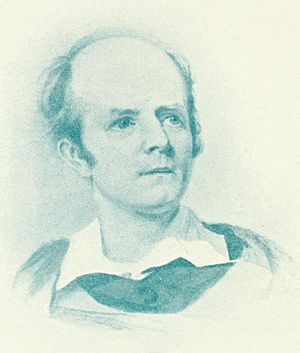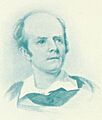Joseph Cottle facts for kids

Joseph Cottle (born 1770, died 1853) was an English publisher and author. He started his business in Bristol, England. He became well-known for publishing the works of famous poets like Samuel Taylor Coleridge and Robert Southey. He offered them very good deals for their books. Later, Cottle wrote his own book called Early Recollections. This book shared personal stories about Coleridge, which some people at the time found controversial.
Life of Joseph Cottle
Joseph Cottle was the brother of Amos Simon Cottle. Unlike his brother, Joseph did not have a classical education. He attended school for two years with Richard Henderson. Henderson suggested that Joseph become a bookseller. So, Cottle opened his own bookselling business in 1791.
In 1794, Cottle met Coleridge and Southey through a friend named Robert Lovell. The poets were in Bristol and planning to move to America. Coleridge had been offered six guineas for his poems in London. But Cottle offered him thirty guineas, which was a much better deal! He offered the same amount to Southey. Cottle also offered Southey fifty guineas for his long poem, Joan of Arc. He even helped arrange talks about a special community idea called pantisocracy. This was a plan for a small, ideal society where everyone was equal.
Cottle also helped Coleridge get married. He promised to pay Coleridge a guinea and a half for every hundred lines of poetry he wrote. This was after Coleridge finished the book they had already agreed on. Coleridge's first book of poems came out in April 1796. Southey's Joan of Arc was published in the same year.
Next, Cottle helped publish and support Coleridge's magazine, The Watchman. Soon after, Coleridge introduced Cottle to another important poet, William Wordsworth. This meeting led to Cottle publishing the famous book Lyrical Ballads in 1798. This book included poems by both Wordsworth and Coleridge. The next year, Cottle decided to retire from his bookselling business.
Years later, Cottle and Coleridge reconnected. In 1814 and 1815, Coleridge was going through a difficult time. Cottle remained a good friend, offering him kind advice and support. In his own book, Biographia Literaria, Coleridge wrote about Cottle. He called him "a friend from whom I never received any advice that was not wise, or a remonstrance that was not gentle and affectionate." Joseph Cottle passed away in Bristol on June 7, 1853.
Joseph Cottle's Writings
Joseph Cottle also wrote several books of his own. Some of his published works include:
- Malvern Hills (published in 1798)
- John the Baptist, a Poem (published in 1801)
- Alfred, an Epic Poem (published in 1801)
- The Fall of Cambria (published in 1809)
- Messiah (published in 1815)
Some of his poems were even mentioned by the famous poet Lord Byron.
In 1837, Cottle published his book Early Recollections, chiefly relating to Samuel Taylor Coleridge. In this book, he wrote about how generous he had been to Coleridge and Southey. He also included many details about Coleridge's personal life. Some people, like Thomas Poole and James Gillman, had advised him not to share so many private details. Southey himself said that the book had some confusing parts and was not always accurate with dates. He also felt some documents were changed.
However, the book also contained interesting information about other people. These included Robert Lovell and William Gilbert. It also featured descriptions of Coleridge, Southey, Wordsworth, and Charles Lamb when they were younger. A second version of the book came out in 1847. It was called Reminiscences of Coleridge and Southey.
The fourth edition of his book Malvern Hills (1829) included extra essays. These essays contained a story about his tutor Henderson. There was also a discussion about whether the Rowley poems were real or fake. He also wrote about the Oreston Caves near Plymouth and the old fossils found there. Cottle's letters about the Rowley manuscripts are kept in the British Museum.
Images for kids
 | Sharif Bey |
 | Hale Woodruff |
 | Richmond Barthé |
 | Purvis Young |


